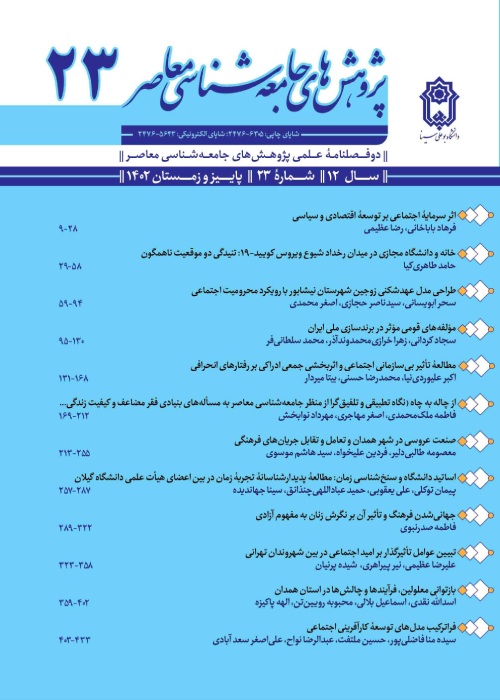Consequences associated with entry of technology to Kurdish populated areas of Southern Azerbaijan Province
Abstract:
This study attempts to identify the ways in which technology and industry have brought about consequences in Kurdish-populated areas. The aim is, also, to determine whether any difference of attitude can be discerned among those who work in industrial and non-industrial sectors. A combination of methods such as group-centrism, focus group, deep interview, oral history, and questionnaire have been used for data-gathering phase; sampling strategy has been based on theoretical, proposed, and eventual sampling. The project type, then, can be referred to as combinative continuous-explanatory project and data gathering method as combinative inter-methodic. Based on grounded theory approach, a model have been offered for depicting the consequences associated with entry of technology to a traditional society, its core concept is " abort development" or "disordered development". This core concept includes all major concepts, categories, and sub-categories of study. Private and Cooperation sector's tendency to industry and establishing quick impact economic institutes are among contextual factors affecting technology entry to this traditional society. An interactive circumstance includes two dimentions: unawareness-indifference and reception-acception. Its consequential dimensions include modern values, development-seeking values, rational values, equalitarian values, ethical values, and traditional values. The results of logistic regression analysis indicate that the probability of accepting value-norm related changes is higher in factory system. Findings of second model of logistic analysis model suggests that gender produces variance in probability patterns of value-norm change acceptance. An interesting point in the third model is that source place, on its own, cannot be considered an important factor in fostering value-norm changes, because with other demographic-social attributes being controlled, no difference can be detected between factory and non-factory systems, in terms of probability of value change acceptance.
Keywords:
Language:
Persian
Published:
Journal of Contemporary Sociological Research, Volume:1 Issue: 2, 2013
Pages:
1 to 22
magiran.com/p1367332
دانلود و مطالعه متن این مقاله با یکی از روشهای زیر امکان پذیر است:
اشتراک شخصی
با عضویت و پرداخت آنلاین حق اشتراک یکساله به مبلغ 1,390,000ريال میتوانید 70 عنوان مطلب دانلود کنید!
اشتراک سازمانی
به کتابخانه دانشگاه یا محل کار خود پیشنهاد کنید تا اشتراک سازمانی این پایگاه را برای دسترسی نامحدود همه کاربران به متن مطالب تهیه نمایند!
توجه!
- حق عضویت دریافتی صرف حمایت از نشریات عضو و نگهداری، تکمیل و توسعه مگیران میشود.
- پرداخت حق اشتراک و دانلود مقالات اجازه بازنشر آن در سایر رسانههای چاپی و دیجیتال را به کاربر نمیدهد.
In order to view content subscription is required
Personal subscription
Subscribe magiran.com for 70 € euros via PayPal and download 70 articles during a year.
Organization subscription
Please contact us to subscribe your university or library for unlimited access!


